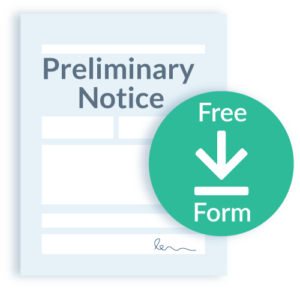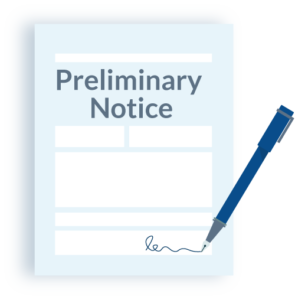Private projects
General contractors are not required to send notice on private projects.
Note, however, that there are specific contractual requirements that contain providing "notice" for direct contractors on home improvement projects.
General contractors are not required to send notice on private projects.
Note, however, that there are specific contractual requirements that contain providing "notice" for direct contractors on home improvement projects.
General contractors are not required to send notice on public projects.
Subcontractors and suppliers are not required to send notice on private projects.
New York is a "non-notice" state and no preliminary notices are required from any party on any project. This extends to project participants furnishing labor or materials to public projects.
Subcontractors and suppliers are not required to send notice on public projects.
No. New York is a non-notice state, meaning that parties to a construction project are generally not required to deliver any preliminary notice to preserve rights.
However, any party may a preliminary notice to promote project visibility, open channels for communication, and attempt to facilitate payment.
• See: Why You Should Send a Preliminary Notice Even If It’s Not Required
Note: there are specific contractual requirements for parties contracting directly with a homeowner on home improvement contracts. One of these required contract provisions is a “notice” to the owner about potential lien exposure on the project.
Since preliminary notices aren’t required, there is no specific timeline to send notice. However, if you do decide to send a preliminary notice there earlier the better. Increasing visibility and communication at the outset of the project can help speed up payments.
There are no specific requirements, so regular mail (or even email) will suffice.
Preliminary notices are traditionally sent to the property owner. However, if you decide to send a preliminary notice, it’s best practice to send a copy to everyone up the payment chain; such as your hiring party and the prime/general contractor as well.
N/A
No. New York is a non-notice state, meaning that parties to a construction project are generally not required to deliver any preliminary notice to preserve rights.
However, any party may a preliminary notice to promote project visibility, open channels for communication, and attempt to facilitate payment.
• See: Why You Should Send a Preliminary Notice Even If It’s Not Required
Furthermore, if the project is bonded, you should request a copy of the payment bond to see if there are any notice requirements.
Since preliminary notices aren’t required, there is no specific timeline to send notice. However, if you do decide to send a preliminary notice there earlier the better. Increasing visibility and communication at the outset of the project can help speed up payments.
There are no specific requirements, so regular mail (or even email) will suffice.
Preliminary notices are traditionally sent to the prime contractor who posted the bond on the public project. However, if you decide to send one, or if the bond requires a notice, its best practice to send a copy to the contracting agency and the surety.
If you're in New York, you have four months to lien the property if it is resedential and eight months if it is commerical. You would have lien rights in this instance, but you'd need to supply proof of the work you performed eventually. Either way, if you did the work, you can lien. Good luck!
I'm sorry to be the bearer of bad news, but it seems like you're out of luck. You have 8 months from the date of your last work to file a mechanic's lien on a non-single family home project such as this. While there is an exception that re-opens your lien rights for 90 days after previously withheld retainage was due to be paid, it sounds like this is the principal contract sum, and not simply late retainage.
Especially if the work is residential, you may run into some trouble without a license, as there are often special requirements including contractual requirements as well. If it's commerical, you may still run into problems, but it's generally not as big of a deal since you're a subcontractor. Remember that it doesnt have to be a formal "signed contract;" if you submitted a proposal and began working without objection from the contractor then you likely have a contract. Lastly, please realize that you could have a breach of contract claim against the contractor, and not just lien rights. This is a tricky issue, be careful.
New York has a rare approach to preliminary notices: the lien law says that they aren’t required for any project participant on any project. This complete lack of noticing requirements definitely makes New York an outlier when it comes to preliminary notice, and construction payment law, the majority of states have at least some notice requirement.
But, while the mechanics lien law specifies no preliminary notices are required whatsoever, is that really the case? Well, pretty much yes. But New York does require preliminary notice of a type for direct contractors performing work pursuant to “home improvement contracts.” The rules regarding home improvement contracts, and that define what actually constitutes a home improvement contract, are set out by New York’s General Business Law. Like other states, New York has specific requirements for contracts related to “the repairing, remodeling, altering, converting, or modernizing of, or adding to, residential property” or the construction of a custom home. These strict contractual requirements are generally formulated to provide protection to the homeowner, given that a piece of residential property is often a person’s largest asset, and many homeowners are not necessarily very sophisticated with respect to either contractual law or construction.
One of the requirements for home improvement contracts, set forth by GBS § 771, is that the contract must contain a notice to the owner that parties furnishing labor or material, and who are not paid, may have a claim against the owner that can be enforced against the property pursuant to applicable lien laws. Additionally, a home improvement contract must include certain specific language about mechanics liens “in clear and conspicuous bold face type.” This required language is:
“Any contractor, subcontractor, or materialman who provides home improvement goods or services pursuant to your home improvement contract and who is not paid may have a valid legal claim against your property known as a mechanic’s lien. Any mechanic’s lien filed against your property may be discharged. Payment of the agreed-upon price under the home improvement contract prior to filing of a mechanic’s lien may invalidate such lien. The owner may contact an attorney to determine his rights to discharge a mechanic’s lien”
While this is a required contractual provision, and not specifically a notice – and it is set forth by the General Business Law and not the mechanics lien law – this requirement is, for all intents and purposes, a preliminary notice related to lien rights that must be provided by parties contracting with a homeowner on certain residential projects.
Additionally, just because there is not really any actual traditional preliminary notice requirements in New York, that doesn’t mean that there is no benefit to sending preliminary notice. There are many reasons that sending preliminary notice, even when not specifically required, is the right thing to do. Sending preliminary notices promotes project visibility, opens channels for communication, and can speed up payment.

The generic preliminary notice form can be used in New York, or any other state where notice isn’t required. Our free forms provide information about your company to the property owner, GC, and other paying parties on a construction project.

The next step is to fill the form out. Make sure you do this as completely and accurately as possible, as GCs and owners will often rely on this document to communicate with you. Mistakes on your New York preliminary notice could cause payment delays.

New York doesn’t have specific delivery requirements. Send the preliminary notice however you see fit.
Select Preliminary Notice document.
Provide basic job information.
Levelset sends the document for you. Postage included!